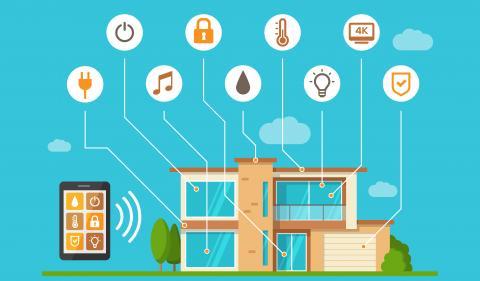
Most of us who are young (even if just at heart!) are pretty comfortable using technology. From smart phones to tablets to driverless cars, we’re used to a world where technology facilitates our experience, saving us time or energy or allowing us to do things once thought impossible with the swipe of a finger.
What’s more novel territory is the role that technology can play in the lives of those from older generations. Whereas it was once common for older people to have a dismissive attitude toward new technological devices, we’re seeing more and more people of all ages look to the world of computers to make the lives of our elderly friends and family more comfortable, more fulfilling, and more independent. It’s no longer surprising for grandkids to text their grandparents! And this attitude of acceptance and willingness to learn opens up a whole new world of resources for one of our most at-risk groups in terms of social isolation and depression.
Often, the elderly experience a decrease in their social network as friends and loved ones either pass away or fall into poor health, making social visits difficult. Limited mobility, visual problems, and other physical ailments can further isolate them. Losing the ability to drive or navigate the bus alone can also be problems facing senior citizens. And then most of their younger family members communicate in ways that they aren’t comfortable with (texting, video chatting)…Combined with losing the ability to do favorite hobbies, these experiences can have debilitating effects on them—and their mental health.
We’re well aware of the negative effects that technology can have on all of us—but let’s not ignore the positive benefits it can provide, too. There are a multitude of ways that technology can improve the life of someone suffering from isolation, limited mobility, visual degeneration, and more. This article does not explore the medically necessary technological improvements, but rather emphasizes how certain features of everyday tech toys can lead to a happier, more independent but less isolated lifestyle for people of all ages. Whether you’re using a tablet, a smartphone, a laptop, a personal home assistant, or a smart speaker, learn how its features can help seniors live a more social and healthier life.
Basic Tools Made Hands-Free & Eyes-Free
For the visually impaired, a smart speaker can offer a multitude of tools—you can talk to it to set an alarm to wake up or remind you of specific events at certain times, for example (think medicine or appointment reminders). You can ask it the weather or other basic questions that others might rely on a smartphone for (opening hours of local businesses, public transportation schedules).
Voice-Activated Home Controls
If mobility is an issue, a home assistant can be useful for controlling lights, temperature, and other devices throughout the house—all from the comfort of a bed or seat. This can make life easier beyond the basic lightbulbs and thermostats—you can get voice-activated plugs that you can use with anything you want. Maybe your grandma likes the electric blanket turned on 45 minutes before she goes to bed, but it’s too difficult for her to reach the switch? She can turn it on without leaving the couch! If getting up to answer and unlock the door is difficult, a screen and voice-activated lock can provide a solution that allows more independence.
Monitoring Home Systems
For seniors who may be starting to show memory problems, a loved one can set up a connection to the smart home device, and all devices connected to it (a front doorbell camera or even a refrigerator or stove if you have one that connects!) can be monitored from that loved one’s smart phone. While a new stove might be cost-prohibitive, a camera doorbell or smart home connected microwave can be feasible and provide an array of options. As the technology continues to develop, expect things like GPS tracking insoles, medication tracking smart devices, and the ability to get alerts for unusual activity in a house (like the stove on for too long or TV on all night) to become more common options.
Personal Medical Alert System
In a limited way, a home assistant can act as a modern personal medical alert system—if you connect it to your phone and contacts, it can make phone calls with a voice command which can provide some comfort if falls are a concern. A smartphone can serve a similar purpose if it’s set up to allow activation and phone calls through a verbal phrase. Check with your provider or device manual for help setting it up, and keep in mind this isn’t a substitute for a true 24-hour medical alert system—but it can be a good in-between step for certain seniors.
Social Media Engagement, Texting, & Video Chatting
As for social interaction, personal home assistants or smart speakers can do some of the same things computers, smartphones, or tablets do. For example, newer ones include screens through which you can initiate video calls with loved ones, all through verbal commands. You can also have these smart speakers read and send text messages, which can allow those with decreased manual dexterity access to one of the most popular forms of communication (and hopefully the ability to text with grandchildren or other family members!). You can do these things with a smartphone, but some older adults find the small screens difficult to see and touch, and they may also be intimidated by the apps required to use. Teaching someone a phrase to say can make the technology more accessible to those who aren’t used to it.
This ability to increase older adults’ ability to use social media and modern forms of communication is one of the most important items on this list because it allows them to interact with friends and family. Whether the person is physically isolated or not, being excluded from all the family happenings on Facebook or being left out of the group text can make seniors feel out of place. Furthermore, they might find it exciting to reconnect with old friends online. Finding a device that allows them to access at least some of these forms of communication can have massive effects on their mental health and socialness.
Games, Puzzles & Stories
Again—smartphones can have screens that are too small for those with limited manual dexterity to use, but tablets or smart speakers can be used to provide access to a ton of games, story programs, and other forms of entertainment. Smart speakers are especially inclusive for their ability to provide things like trivia games, mystery programs, choose your own adventure stories, and more all through verbal commands and audio responses. For those with more visual and physical ability, tablets can provide fun through games like puzzles, coloring, Sudoku, word searches, and more. There are also many different memory games available that can help seniors keep their minds sharp. A simple search will show you what is available on your device in your area of interest.
Music & Movies
Tablets and laptops provide another great resource for seniors—access to YouTube and other video streaming services for listening to old songs or clips from old movies (or even the entire film in some instances). Music is renowned for its ability to be accessed even by those with severe memory problems—it’s amazing how often a senior with memory problems can sing along with every word when hearing songs from their youth! Old movies might provide a similar glimpse into the past for older adults. Ask them what they like, and see what you can find!
Talk-to-Text or Audio/Video Recording
If an older adult loves to write but finds themselves unable to handwrite or type due to vision or hand problems, talk-to-text on a smartphone, tablet, or laptop can be a wonderful alternative solution. While it’s not a perfect program (accuracy varies by device and program), it can be enough to allow seniors to still preserve their ideas, especially if they’re interested in writing something like their life story or a family history. If talk-to-text doesn’t work out, there’s also the option to audio or video record them telling their story. For someone for whom journaling, writing, teaching, or storytelling was an important part of their life, maintaining the ability to record their thoughts can be a welcome relief.








